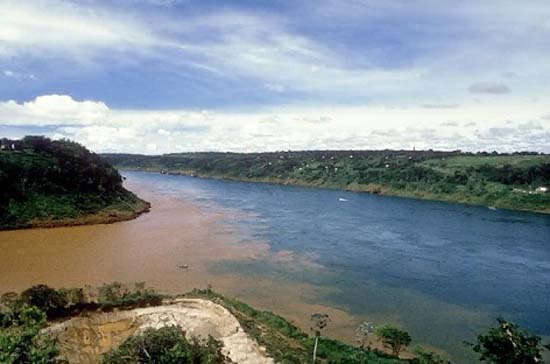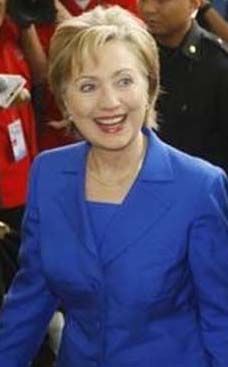
Horton hopes her work in documenting the group's culture will help them preserve it, just as she hopes that photographs of hers, which begin a national exhibition in Paraguay this week, will help preserve the environment of the landlocked South American country. Preserving the discrete cultures of the indigenous people of Paraguay could help teach outside Westerners better ways to conserve the environment and use natural resources, Horton says. Horton stayed with this particular group for several weeks this winter in their traditional lands a four-days' boat ride from Asuncion, the capitol of Paraguay. Horton took photographs and film of traditional storytelling festivals, then gave the leaders discs of video and photographs to use when they present their case before lawmakers for better protections. Her records also help to preserve the intricate, complicated sacred myths that are the holy scriptures for these people.
Paraguay RPCV Emily Horton hopes she can help save the cultures of the people of the Pantanal, the wetlands that lie at the heart of South America
Photos to document variety of traditions, cultures in wetlands
Friday, February 20, 2009
By KAY CAMPBELL Times Faith & Values Editorkay.campbell@htimes.com
Missionaries nearly destroyed the cultures of the people of the Pantanal, the wetlands that lie at the heart of South America. Emily Horton hopes she can help save it.
"The missionaries came in and taught us - and we began to believe it - that our culture was evil and wrong, something to change, something to be ashamed of," says a woman dressed in the traditional feathered apron of a shaman in a video taken this winter by Horton, who lives in Greenbrier.
Horton hopes her work in documenting the group's culture will help them preserve it, just as she hopes that photographs of hers, which begin a national exhibition in Paraguay this week, will help preserve the environment of the landlocked South American country.
Preserving the discrete cultures of the indigenous people of Paraguay could help teach outside Westerners better ways to conserve the environment and use natural resources, Horton says.
Horton stayed with this particular group for several weeks this winter in their traditional lands a four-days' boat ride from Asuncion, the capitol of Paraguay. Horton took photographs and film of traditional storytelling festivals, then gave the leaders discs of video and photographs to use when they present their case before lawmakers for better protections.
Her records also help to preserve the intricate, complicated sacred myths that are the holy scriptures for these people.
No God-cubicals
Paraguay is home to 17 distinct ethnic groups, each of which speaks a dialect of one of five indigenous languages. The human diversity mirrors the natural one, which is what drew Horton, 27, to Paraguay.
Her work with the Peace Corps gave her the opportunity to help support local efforts to recover land that has been denuded under the pressures of large-scale farming and Western-style development. After her two-year Peace Corps contract, she stayed another five months to write and photograph a book for Association Guyra Paraguay, an environmental organization working to conserve the remaining stretches of virgin forest and wetlands in the country.
Her bilingual book, "Saving/Salvemos San Rafael," was published last year and is available at www.nhbs.com. She returned to Paraguay during the fall and winter of 2008 to photograph the Pantanal, a wetlands the size of Greece that lies at the heart of South America where Paraguay, Brazil and Bolivia touch. She will complete that book this year.
When she is not in Paraguay, she lives in the Huntsville area, helping her father, John Horton, with his honeybee hives and working as a translator.
"One thing I learned (in Paraguay) is that I was not an expert," said Horton, who holds a bachelor's in environmental science and communications with a minor in Latin American studies. "I spent the first year just learning. These people understand way more about local crops and environment. Then I could complement their pre-existing knowledge."
Her's is a zeal, she knows, that mirrors that of the Christian missionaries that fanned across the globe. Horton finds herself among a new generation that wants to "save" people, but in a different way than the usual missionary.
"I feel a responsibility to contribute what skills I have to try to make the world a better place, as cheesy as that sounds," Horton said. "I feel a responsibility to work toward something positive in this short life time we have."
Horton hopes she helps the people she comes in contact with more than she hurts them. She can look to the result of missionary work as both inspiration and cautionary tale.
The missionaries brought a mixed blessing to the people they taught, Horton said. They helped to preserve languages by translating of the Bible into obscure tongues that merchants would never have bothered to learn. But they also, as the shaman in her video notes, brought a message that defined local religious customs as either in error or, sometimes, diabolical.
As Horton listened to the respected elders tell the intricate stories of their ancient beliefs, she could see the magical beauty that tied each new generation from the tribe to the rhythms of nature and their cultural wisdom.
"Their culture is so complex and profound," Horton said. "It was beautiful and magical. Their stories, like the stories in our Bible, team moral lessons, but they are localized - so a character in the story would be a bird flying by."
Though her own parents are fervent Christians, Horton explains her own spirituality in less defined ways, a trend that mirrors one growing in the U.S., particularly among Horton's peers. A study released last year by the Pew Forum on the Religious Landscape of the U.S. showed that an increasing number of Christians believe it is possible for those of other faiths to receive eternal life.
"I feel like my concept of God doesn't deny other definitions," Horton said. "The concept of God feels so big to me that I don't think I could box it up and put it into a nice little cubical. I don't feel like I could say, 'God is exactly this.'"
Learning together
Horton sees as much, or more, to learn from the indigenous people of the world as she has to teach.
"No group is perfect, but I have observed that just their philosophy and approaches are just more sustainable than the current (industrialized) trends, which is to milk something for all it's worth," Horton said.
Horton hopes that the lesson of the near-eradication of the indigenous people in the U.S., will help save these groups in South America.
"Even though they are becoming modernized, if they can hold onto the core of their culture, maybe they will come out better in the long run," Horton said. "They are going to change, but there are different ways to make the transit."
Not only this group of people will benefit, Horton says, but maybe we all will.
"If people could recognize that other cultures and myths have value and contribute positive things, rather than seeing them as a threat or a challenge to their own beliefs," Horton said, "maybe we could combine the insights and the lessons of both."












